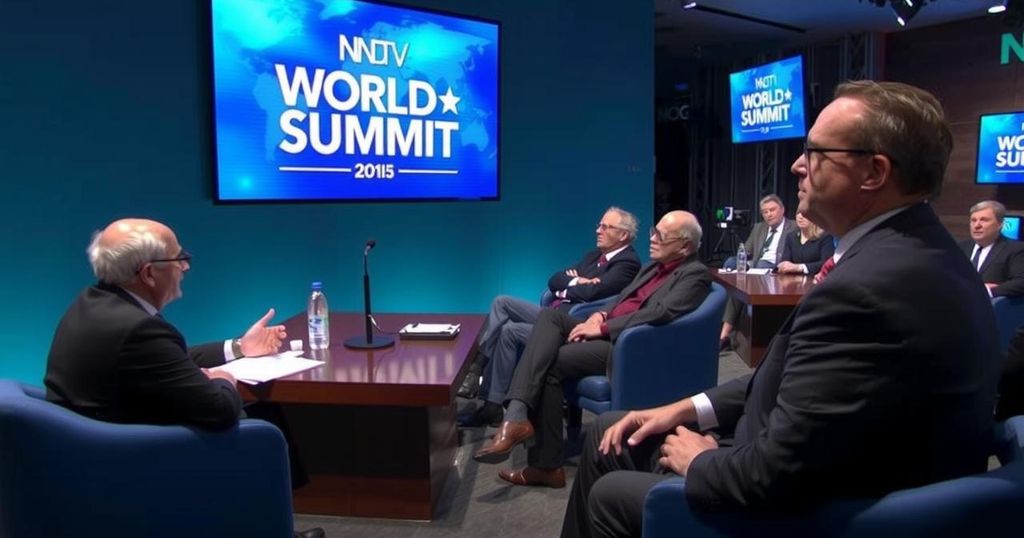Israeli Envoy Asserts Right to Retaliate Against Iranian Aggression at NDTV World Summit
During the NDTV World Summit, Israeli Ambassador Reuven Azar underscored Israel’s right and duty to retaliate after Iran’s missile attack. He highlighted Israel’s commitment to peace while emphasizing the necessity of deterrence. Additionally, Azar noted India’s rising economic power and potential contributions to regional stability and collaboration in West Asia.
The Israeli Ambassador to India, Reuven Azar, reaffirmed Israel’s resolve to retaliate against Iran following an attack in which Iran launched over 180 missiles toward Israel on October 1. During his interview at the NDTV World Summit, Ambassador Azar emphasized that while Israel is committed to fostering peace and stability in the region, it cannot accept a scenario where Iran can launch attacks without facing consequences. Regarding Israel’s strategic response, Azar stated, “Imagine a situation in which a country like Iran is capable of threatening any country in the region without any repercussions… this is completely unacceptable.” He highlighted Israel’s ongoing efforts to maintain stability through established peace agreements with neighboring Jordan and Egypt, as well as the Abraham Accords involving the UAE, Bahrain, Morocco, and Sudan, asserting that further dialogue with Saudi Arabia is also part of their peace-building efforts. The ambassador expressed confidence in Israel’s military capacity to defend against Iranian threats, but notably insisted that retaliatory measures are not optional but a necessity, saying, “We have proved after the attack by Iran that we are capable of defending the skies of the Middle East from the Iranian threat, but we cannot be in a situation in which the Iranians feel free to attack us at any point. This is why the security building block has to be complemented by our retaliation.” On the topic of Hamas and its military capabilities, Mr. Azar detailed new developments, asserting that the current situation is markedly different from prior conflicts: “What we have managed to achieve in the Gaza Strip right now is that we have defeated the terrorist army of Hamas in a way that they cannot pose a missile threat to Israel.” He acknowledged the challenges faced in retrieving hostages taken during the October 7 attack but affirmed their commitment to undermining Hamas by facilitating humanitarian assistance to the population of Gaza to prevent Hamas from exploiting their suffering. Ambassador Azar also highlighted the strategic role of India as an emerging power in the West Asian region. He noted India’s impressive economic growth of seven percent projected for the upcoming year, amounting to a $260 billion increase, contrasting it with Israel’s economy of $600 billion. He remarked, “When all this infrastructure of connectivity is set, we are going to see an incredible role of India in our region,” stressing the potential for enhanced trade and manufacturing collaboration with nations in West Asia.
The recent statements made by Israeli Ambassador Reuven Azar occur against a backdrop of escalating tensions between Israel and Iran, particularly following Iran’s missile attack on Israel. This conflict feeds into broader geopolitical dynamics in the Middle East, influencing Israel’s security policies while underscoring its diplomatic engagements with neighboring countries. The ambassador’s remarks also reflect Israel’s perspective on regional stability and its military posture towards threats from militant groups like Hamas. At the same time, the emphasis on India’s growing influence and economic power positions India as a significant player in the Middle Eastern geopolitical landscape.
In summary, Ambassador Reuven Azar emphasized Israel’s commitment to retaliate against Iranian aggression while advocating for regional stability through diplomatic efforts. He asserted Israel’s military readiness against threats and recognized India’s burgeoning role in shaping the future dynamics of West Asia amid ongoing conflicts.
Original Source: www.ndtv.com




Post Comment